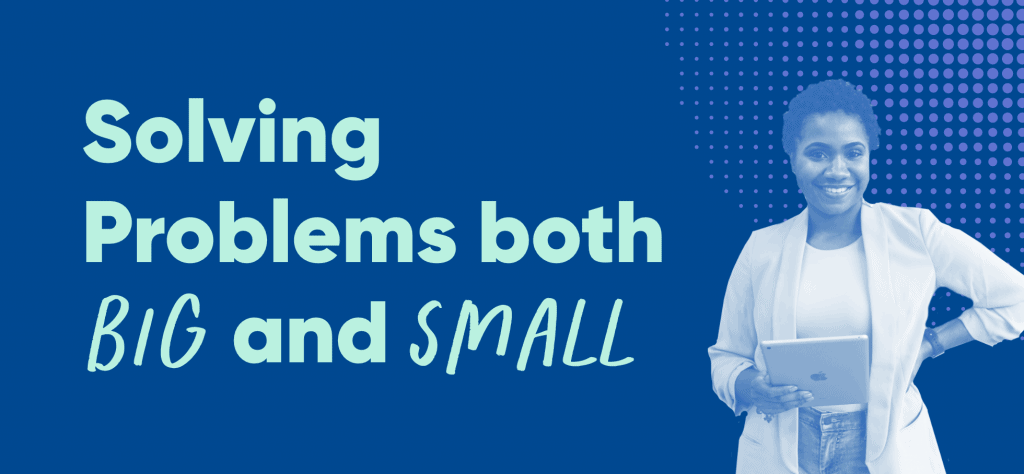Solving Problems Both Big & Small

I’ve been thinking about the problems we solve as financial planning professionals.
Helping our clients figure out how to save for their children’s college, save for retirement, prepare for a change in employment, handle taxes, etc.
We solve pretty large-scale “problems” on a daily basis. And, because we’re the experts, we can help people get to the root of the problems they’re trying to solve.
Getting to the root of our clients’ problems
Maybe it’s how they can make more money to save for their move by addressing their spending. Maybe it’s how much they need to save to retire comfortably — and helping them identify what “comfortable” means to them.
Sure, we know their big goals, but what they really need is to have someone help them understand how to get there and what obstacles they might face along the way. Knowing their exact challenge changes how we engage with them, the plans we create, the way we interact with and support them.

But we don’t just solve problems for our clients. We also solve problems for ourselves.
Applying your problem-solving skills to your own challenges
Are you trying to create work/life balance? Are you trying to serve an underserved community with your services? Are you trying to build your own practice?
Just like in our work, we shouldn’t just start solving these problems without thinking about them. We have to really get down to the root of the issue and identify what we really want.
Only then can we start working toward solving our problems.
If you want work/life balance, you can’t just start “living more.” You have to really think about what a good balance looks like for you. If you’re trying to start your own practice, you can’t just quit your day job. You need to know who your ideal client is, how your practice would be structured, and how you’ll make the shift from employment to business ownership, if that’s what you want to do.
We have to identify the challenges that will arise as we move toward our goals.
Of course, I know it can be paralyzing to think about the big picture and what you’re actually trying to solve, which is why I always tell new planners to focus on the problem you can solve immediately/soon. Then you can refocus the purpose on a future problem or goal.
If it’s work/life balance you want, maybe you can delete your email app from your phone so you don’t check it at home. If you want to start your own firm, maybe you can start looking into licenses you need to practice your state.
Taking these small steps and just acting on what comes next can make such a huge impact in our personal and professional challenges.
Focusing on small problems can help us fix bigger ones
I’ve also found that, over time, these small steps lead up to big changes — changes that can actually address challenges in other places.
By solving the problem of work/life imbalance, we might also find that we are more fulfilled in our careers. By trying to serve a new community, we may realize that we have a stronger niche than we originally thought. By trying to build your own practice, you may also solve the problem of wanting to work remotely.
With the launch of the second FPA Virtual Externship in June 2021, I was also thinking about the problems that initiative was designed to solve. It was originally created to help interns who had lost their internships due to the pandemic, but we also found that the externship solved a problem we had struggled with for years: Access to financial planning as a profession.

If we had just said “We’re going to find a way to create more access to financial planning,” I don’t think we would have had the reach and impact that we did. We started with the smaller problem right in front of us, and we took the next step.
So… what’s your challenge? And what’s your first step?
Dig deeper into the profession
Want more thoughts just like this, delivered right to your inbox? Sign up for the Amplified Planning weekly newsletter below. Hundreds of financial planners get these messages each week, sparking important conversations about the work we do and the lives we want to create.
